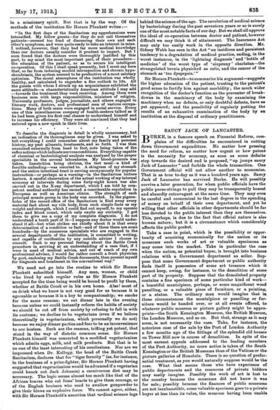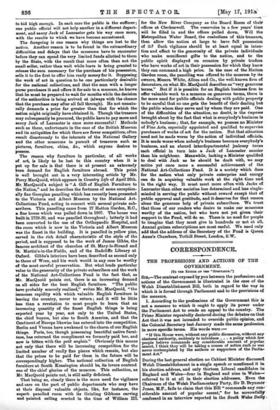SAUCY JACK OF LANCASTER.
BITRKE, in a famous speech on Financial Reform, com- plains of the difficulties he encountered in cutting down Government expenditure. No matter how pressing the need for reform, no matter how urgent or how patent is the necessity for economy, as soon as some definite step towards the desired end is proposed, "up jumps saucy Jack of Lancaster" and forbids the whole transaction. One Government official will not allow another to economize. That is as true to-day as it was a hundred years ago. Saucy Jack of Lancaster has survived Burke. He will possibly survive a later generation, for when public officials have the public purse-strings to pull they may be transparently honest and absurdly extravagant at the same time. They may even be careful and economical to the last degree in the spending of money on behalf of their own department, and yet be willing that other officials in other departments should be far less devoted to the public interest than they are themselves. This, perhaps, is due to the fact that official nature is also human nature; but it is a circumstance which considerably affects the public pocket.
Take a case in point, which is the possibility or oppor- tunity of acquiring economically for the nation or its museums such works of art or valuable specimens as may come into the market. Take in particular the case when the nation, as potential buyer, is brought into business relations with a Government department as seller. Sup- pose that some Government department or public authority finds itself in possession of some art treasure which it cannot keep, owing, for instance, to the demolition of some part of its property. Suppose that the demolished property contains a fine specimen of some particular kind of work—. a beautiful mantelpiece, perhaps, or some magnificent wood panelling, or a valuable piece of furniture, or a painting, or a statue. The ordinary man would imagine that in these circumstances the mantelpiece or panelling or fur- niture would be handed over, or at all events offered, to whatever public museum or picture gallery might be appro. priate—the South Kensington Museum, the British Museum, the London Museum, and so on. But that, strange as it may seem, is not necessarily the case. Take, for instance, the notorious case of the sale by the Port of London Authority a few months ago of the fittings of the splendid old houses on Tower Hill now in course of demolition. In spite of the most earnest appeals addressed to the leading members of the Port Authority, no more notice is taken of the South Kensington or the British Museums than of the Vatican or the picture galleries of Honolulu. There is no question of prefer- ential treatment, as you would naturally suppose would be the case. What that means those who have experience of public departments and the resources of private bidders may easily imagine. Possibly the work of art is lost to the country because the museums did not know it was for sale; possibly because the finances of public museums are not inexhaustible, some valuable specimen goes to a private buyer at less than its value, the museum having been unable
to bid high enough. In each case the public is the sufferer ; one public official will not help another in a different depart- ment, and saucy Jack of Lancaster gets his way once more, with the results to which we have become accustomed.
The foregoing is one reason why things are lost to the nation. Another reason is to be found in the extraordinary difficulties and delays that the museums have to encounter before they can spend the very limited funds allotted to them by the State, with the result that more often than not the small seller, rather than wait while leave is being granted to release the sum necessary for the purchase of his possession, sells it to the first to offer him ready money for it. Supposing the work of art in question to be one particularly desirable for the national collections, and that the man with a longer purse purchases it and offers it for sale to a museum, he knows that he must be prepared to wait for months while the decision of the authorities is being arrived at (always with the chance that the purchase may after all fall through). He not unnatu- rally demands a price far greater than that for which the nation might originally have obtained it. Though the treasure may subsequently be procured, the public have to pay more and saucy Jack of Lancaster is once more successful ! Methods such as these, unfortunate in the case of the British Museum and its antiquities for which there are fewer competitors, often result disastrously to the interests of the National Gallery and the other museums in pursuit of treasures such as pictures, furniture, china, 8c., which anyone desires to possess.
The reason why furniture in particular, of all works of art, is likely to be lost to this country when it is put up for sale is that there is at present an extremely keen demand for English furniture abroad. This point is well brought out in a very interesting article by Mr. Percy MacQuoid, which appears in Country Life of April 20th. Mr. MacQuoid's subject is "A Gift of English Furniture to the Nation," and he describes the fortunes of some exception. ally fine Georgian panelling which has recently been presented to the Victoria and Albert Museum by the National Art- Collections Fund, acting in concert with several private sub- scribers. This panelling came from 27 Hatton Garden, E.C., a fine house which was pulled down in 1907. The house was built in 1729-30, and was panelled throughout ; latterly it had been converted to the use of the Orthopaedic Hospital, and the room which is now in the Victoria and Albert Museum was the finest in the building. It is panelled in yellow pine, carved in the rich detail characteristic of the style of the period, and is supposed to be the work of James Gibbs, the famous architect of the churches of St. Mary-le-Strand and .t. Martin's-in-the-Fields, and of the Radcliffe Library at Oxford. Gibbs's interiors have been described as second only to those of Wren, and his work would in any case be worthy of the most careful preservation. But what lends particular value to the generosity of the private subscribers and the work of the National Art-Collections Fund is the fact that, as Mr. MacQuoid points out, there is an increasing demand on all sides for the best English furniture. "The public have probably scarcely realized," writes Mr. MacQuoid, "the immense rapidity with which valuable English furniture is leaving the country, never to return ; and it will be little less than a revelation to most people to learn that an increasing quantity of the finest English things is being exported year by year, not only to the 'United States, the chief buyers, but also to South America, and that the Continent of Europe likewise has entered into the competition. Berlin and Vienna have awakened to the charm of our English things. Paris, too, though possessing beautiful native furni- ture, has returned the compliment we formerly paid her, and now is bitten with the gout anglais." Obviously this means not only that there will be increasing competition for the limited number of really fine pieces which remain, but also that the prices to be paid for them in the future will be correspondingly higher. The national collection of English furniture at South Kensington should be, its lovers contend one of the chief glories of the museum. This collection, as Mr. MacQuoid points out, is still sadly deficient.
That being so, clearly there is the more need for vigilance and care on the part of public departments who may have at their disposal valuable objects, like, for instance, the superb panelled room with its Grinling Gibbons carving and painted ceiling erected in the time of William III. for the New River Company as the Board Room of their offices at Clerkenwell. The reservoirs in a few years' time will be filled in and the offices pulled down. Will the Metropolitan Water Board, the custodians of this treasure, then allow the nation at large to have full possession of it? Such vigilance should be at least equal in inten- tion and effect to the generosity of the private individuals who make munificent gifts to the nation, and to the public spirit displayed on occasion by private traders who have works of art in their possession for which they know they can command a high price. In the case of the Hatton Garden room, the panelling was offered to the museum by its owners, Messrs. White, Allom and Co., the well-known firm of decorators, on what Mr. MacQuoid describes as "very generous terms." But if it is possible for an English business firm to offer valuable work to a museum on generous terms, there is far more need for public officials dealing with public property to be careful that no one gets the benefit of their dealing but the public whom they serve and by whom they are paid. One of the difficulties of the situation, no doubt, is the impasse brought about by the fact that what is everybody's business is nobody's business ; that, for example, we possess no Minister of Fine Arts, especially appointed and qualified to supervise purchases of works of art for the nation. But that situation need not be made worse by the action of individual officials. It is made worse when nobody's business becomes everybody's business, and an absurd interdepartmental jealousy turns each official in turn into a Jack of Lancaster saucier than his neighbour. Meanwhile, lacking a Minister qualified to deal with Jack as he should be dealt with, we may notice yet once more a successful achievement of the National Art-Collections Fond. It is a society which does for the nation what only private enterprise and energy can do in acquiring valuable work at the right time and in the right way. It must meet more often with Jacks of Lancaster than other societies less determined and less single- minded in serving the public without reward except that of public approval and gratitude, and it deserves for that reason alone the generous help of private subscribers. We trust that those of our readers who desire to make our museums worthy of the nation, but who have not yet given their support to the Fund, will do so. There is no need for people to imagine that they must give in hundreds or not at all. Annual guinea subscriptions are most useful. We need only add that the address of the Secretary of the Fund is Queen Anne's Chambers, Tothill Street, London, S.W.











































 Previous page
Previous page